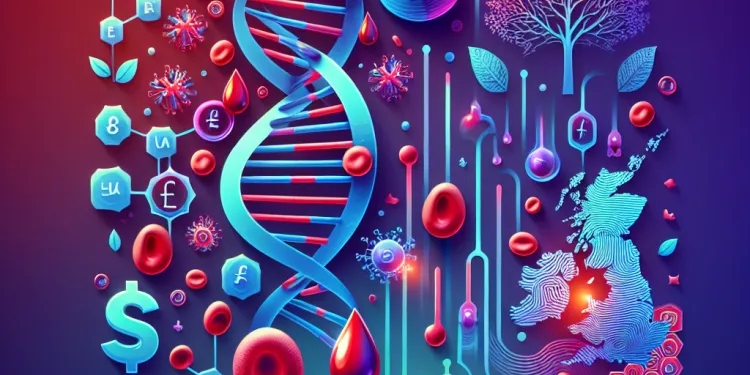
Find Help
More Items From Ergsy search
-
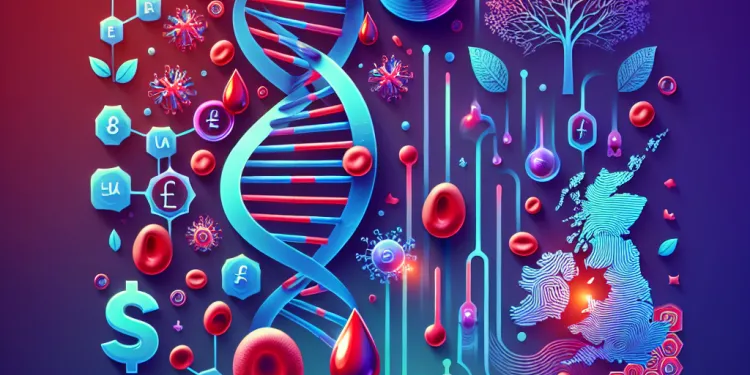
How is sickle cell disease inherited?
Relevance: 100%
-
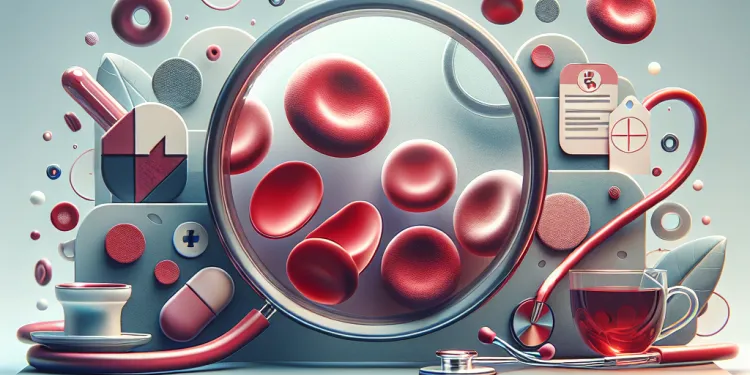
What is sickle cell disease?
Relevance: 90%
-

Introduction to Sickle cell disease
Relevance: 88%
-
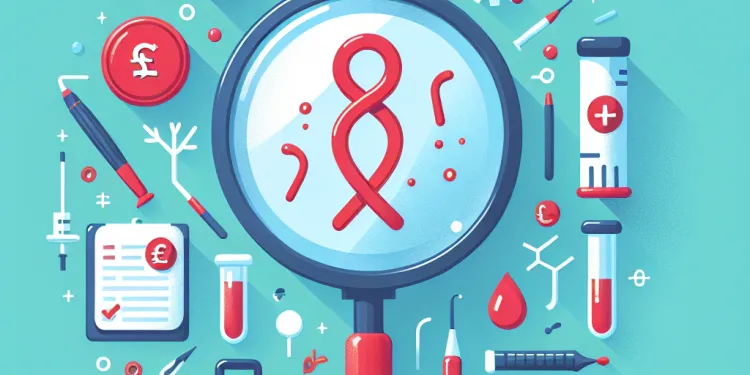
How is sickle cell disease diagnosed?
Relevance: 80%
-

What are the complications of sickle cell disease?
Relevance: 80%
-

What are the symptoms of sickle cell disease?
Relevance: 77%
-
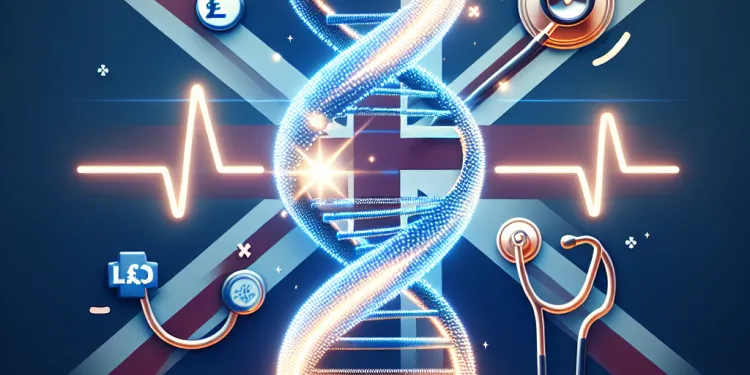
How is sickle cell disease treated?
Relevance: 77%
-

Sickle cell anaemia | NHS
Relevance: 74%
-

Tour of the Sickle Cell and Thalassaemia Unit at City Hospital | SCaT
Relevance: 61%
-

Sickle cell patients share their experiences with the last NHS Chief Executive Amanda Pritchard
Relevance: 55%
-

What is Mitochondrial disease?
Relevance: 33%
-

How is Huntington's disease inherited?
Relevance: 32%
-

Can Huntington's disease be cured?
Relevance: 29%
-
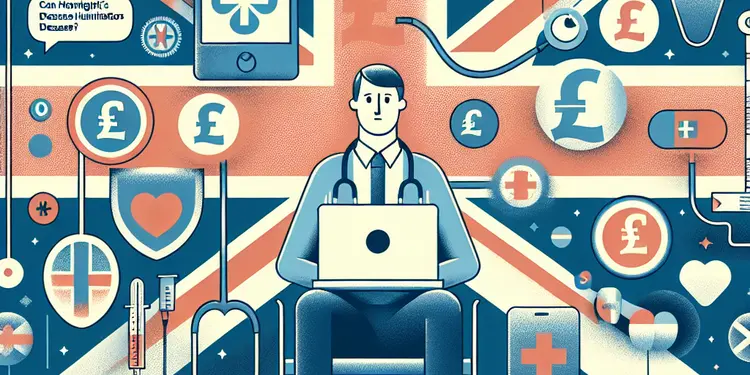
Can Huntington's disease be prevented?
Relevance: 29%
-

Will I be in a shared or single cell?
Relevance: 29%
-
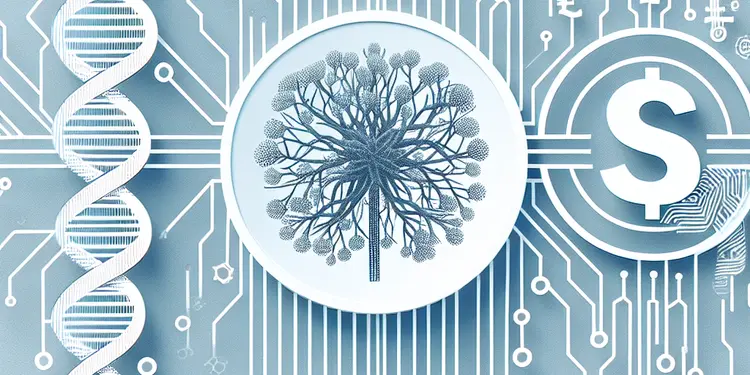
Is motor neurone disease hereditary?
Relevance: 29%
-

What causes Huntington's disease?
Relevance: 29%
-

Do I pay Inheritance Tax on a property I inherit?
Relevance: 27%
-
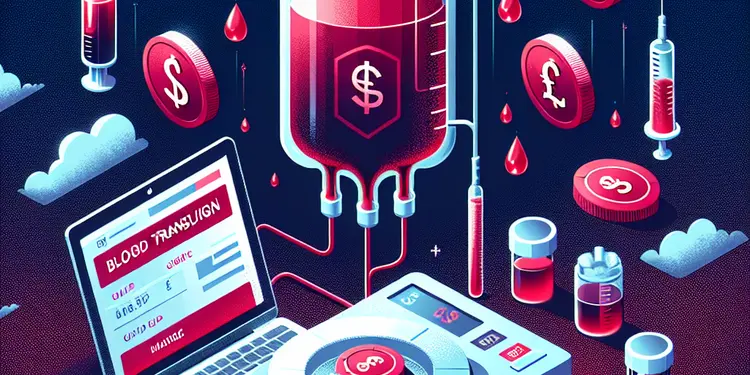
Why might someone need a blood transfusion?
Relevance: 26%
-

What is Huntington's disease?
Relevance: 26%
-
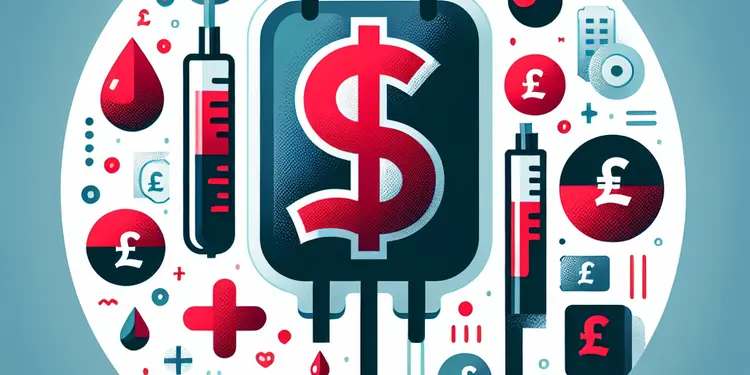
What are some common reasons blood transfusions are needed?
Relevance: 26%
-

What is inheritance tax?
Relevance: 25%
-

What is Inheritance Tax?
Relevance: 25%
-

What is inheritance tax in the UK?
Relevance: 25%
-

What is Inheritance Tax?
Relevance: 25%
-

When do I find out about my cell assignment?
Relevance: 25%
-

What is inheritance tax in the UK?
Relevance: 25%
-
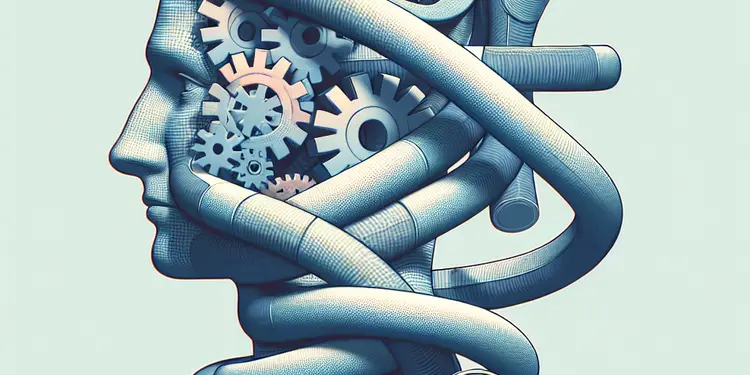
Is Huntington's disease fatal?
Relevance: 24%
-

When is inheritance tax due?
Relevance: 24%
-

Who pays the inheritance tax?
Relevance: 24%
-

What role do genetics play in motor neurone disease?
Relevance: 24%
-

How is inheritance tax calculated?
Relevance: 24%
-

Are there deductions available for inheritance tax?
Relevance: 24%
-

Are there tax-free thresholds for inheritance tax?
Relevance: 24%
-

Can inheritance tax be deferred?
Relevance: 24%
-

Is there a cure for motor neurone disease?
Relevance: 24%
-

Which countries impose inheritance tax?
Relevance: 24%
-
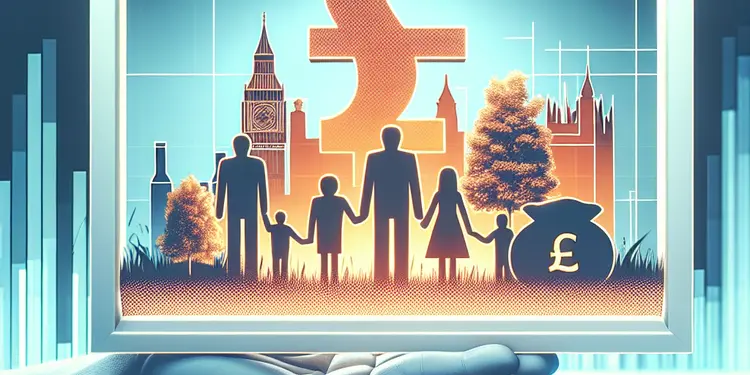
Who is responsible for paying Inheritance Tax?
Relevance: 23%
-

What assets are subject to inheritance tax?
Relevance: 23%
-

When is inheritance tax due to be paid?
Relevance: 23%
Understanding the Inheritance of Sickle Cell Disease
Sickle cell disease is a genetic condition that affects the red blood cells, causing them to assume an abnormal crescent, or sickle, shape. This shape change can lead to blockages in blood vessels and a range of serious health issues. Understanding how sickle cell disease is inherited is crucial for families who may be affected by this condition.
Genetic Basis of Sickle Cell Disease
The root cause of sickle cell disease lies in a mutation of the HBB gene, responsible for producing haemoglobin, the protein that allows red blood cells to carry oxygen throughout the body. Specifically, sickle cell disease is caused by a mutation known as HbS. Individuals with this condition inherit two copies of the sickle cell gene—one from each parent. This is known as autosomal recessive inheritance.
Autosomal Recessive Inheritance Explained
In autosomal recessive inheritance, a person must receive two copies of the altered gene to manifest the disease. Individuals with one mutated gene and one normal gene are termed "carriers" or have "sickle cell trait." Carriers usually do not exhibit symptoms of sickle cell disease but can pass the mutated gene on to their children. For a child to develop sickle cell disease, both parents must contribute the sickle cell gene.
Probability of Inheritance
The risk of a child inheriting sickle cell disease depends on the genetic status of the parents. If both parents are carriers of the sickle cell trait (HbAS), there is a 25% chance that their child will inherit two sickle cell genes (HbSS) and thus have sickile cell disease. There is a 50% chance the child will be a carrier like their parents, inheriting one sickle cell gene and one normal gene (HbAS). Lastly, there is a 25% chance the child will inherit two normal genes (HbAA), and neither have the disease nor be a carrier.
Implications for Families
For families with a history of sickle cell disease, genetic counselling could help prospective parents understand their genetic risk and the likelihood of passing the condition onto their offspring. In the UK, sickle cell screening is offered to all pregnant women and, if necessary, to their partners, to identify carriers and help inform family planning decisions. This proactive approach plays a vital role in awareness and management of the condition.
Conclusion
Understanding the inheritance pattern of sickle cell disease empowers families with valuable knowledge for planning and managing this serious health condition. By comprehending autosomal recessive inheritance and the role of being a carrier, families can make informed decisions, facilitated by genetic screening and counselling services available in the UK. Awareness and education remain key to addressing the challenges posed by sickle cell disease.
Understanding How Sickle Cell Disease is Passed Down
Sickle cell disease is a problem with your blood. It makes the red blood cells look like a sickle or crescent shape. These funny-shaped cells can block blood flow and cause health problems. Learning how sickle cell disease is passed from parents to children helps families who might have this condition.
What Causes Sickle Cell Disease?
Sickle cell disease starts with a change, or mutation, in a gene called HBB. This gene helps make haemoglobin, the part of blood that carries oxygen. The change in the gene is called HbS. A person with sickle cell disease gets two HbS genes, one from each parent. This is called autosomal recessive inheritance.
What is Autosomal Recessive Inheritance?
Autosomal recessive inheritance means you need two changed genes to have the disease. People with one changed gene and one normal gene are called "carriers." Carriers do not usually get sick, but they can pass the changed gene to their children. A child gets sickle cell disease if both parents pass the sickle cell gene to them.
Chances of Passing It On
If both parents are carriers (HbAS), these are the chances for their child: - 25% (1 in 4) chance the child will have sickle cell disease (HbSS). - 50% (1 in 2) chance the child will be a carrier like the parents (HbAS). - 25% (1 in 4) chance the child will not have the disease and will not be a carrier (HbAA).
What This Means for Families
Families with sickle cell disease history can talk to a genetic counsellor. A counsellor helps parents understand their chances of passing the disease to their children. In the UK, pregnant women and their partners can get tested to see if they are carriers. This helps them make choices about having children. Testing and counselling can make families more aware and help them manage the condition.
Wrapping It Up
Knowing how sickle cell disease works helps families plan and manage this health problem. By understanding how genes are passed down, families can make informed choices. In the UK, tests and counselling are available to support families. Being aware and educated is important in handling the challenges of sickle cell disease.
Frequently Asked Questions
What is sickle cell disease?
Sickle cell disease is a genetic blood disorder characterized by red blood cells that assume a sickle or crescent shape, which can block blood flow and cause complications.
How is sickle cell disease inherited?
Sickle cell disease is inherited in an autosomal recessive manner, meaning a child inherits two sickle cell genes, one from each parent, to have the disease.
What does autosomal recessive mean?
Autosomal recessive means that two copies of an abnormal gene must be present for a disease or trait to develop. Individuals with one copy are carriers.
What is a carrier of sickle cell disease?
A carrier of sickle cell disease has one normal hemoglobin allele and one sickle cell allele. They typically do not show symptoms and are said to have sickle cell trait.
Can two carriers have a child with sickle cell disease?
Yes, if both parents are carriers of the sickle cell trait, there is a 25% chance with each pregnancy that their child will inherit two sickle cell genes and have the disease.
If one parent has sickle cell disease and the other is a carrier, what is the chance their child will have the disease?
There is a 50% chance their child will inherit sickle cell disease and a 50% chance the child will be a carrier.
Can two people with sickle cell trait have a healthy child?
Yes, there is a 25% chance that their child will inherit two normal hemoglobin alleles and not have the disease or the trait.
Is sickle cell disease more common in certain populations?
Yes, sickle cell disease is more common in people of African, Mediterranean, Middle Eastern, and Indian ancestry.
Can sickle cell disease be detected before birth?
Yes, prenatal screening and genetic testing can detect sickle cell disease in the fetus.
How does sickle cell trait differ from sickle cell disease?
Sickle cell trait means carrying one sickle cell gene and one normal gene, while sickle cell disease means having two sickle cell genes resulting in symptoms.
What is the likelihood that a carrier's child will also be a carrier?
If one parent is a carrier, there is a 50% chance their child will inherit the sickle cell trait and be a carrier.
Can a person with sickle cell trait develop sickle cell disease?
No, individuals with sickle cell trait usually do not develop the disease unless they inherit a second sickle cell gene from the other parent.
How is genetic counseling helpful for families with a history of sickle cell disease?
Genetic counseling can provide information, support, and guidance to families at risk, helping them understand inheritance patterns and risks.
Why is sickle cell disease genetic screening important?
Genetic screening can help identify carriers and affected individuals early, allowing for informed family planning and early intervention.
Can sickle cell disease be cured?
Currently, there is no widespread cure, but treatments such as bone marrow transplants and gene therapy are potential options for some patients.
Is it possible for someone with no family history to have a child with sickle cell disease?
Yes, if both parents are carriers and unaware of their status, they can have a child with sickle cell disease despite no known family history.
Does having the sickle cell trait offer any benefits?
Carriers of the sickle cell trait are less likely to suffer from malaria, which may explain the higher frequency of the trait in malaria-endemic regions.
What genetic mutations cause sickle cell disease?
Sickle cell disease is primarily caused by a mutation in the HBB gene on chromosome 11, leading to abnormal hemoglobin production.
How is sickle cell disease diagnosed?
Sickle cell disease is diagnosed using a blood test that screens for the presence of sickle hemoglobin.
Can environmental factors influence the inheritance of sickle cell disease?
No, the inheritance of sickle cell disease is purely genetic and is not influenced by environmental factors.
What is sickle cell disease?
Sickle cell disease is an illness that affects the blood. It can make you feel very tired and can cause pain. The red blood cells in your body are a different shape. They look like a banana or a sickle.
If you have sickle cell disease, it is important to see a doctor. You can also talk to a nurse about how to feel better.
Tools that can help include simple picture books about the illness. You can also use apps that explain sickle cell disease with pictures and videos.
Sickle cell disease is something you are born with. It affects the blood. In this disease, some red blood cells look like a sickle or crescent moon. These cells can block blood flow and cause problems.
How do people get sickle cell disease?
Sickle cell disease is a sickness that you get from your parents. You need to get a sickle cell gene from both your mom and your dad to have the sickness.
What does autosomal recessive mean?
"Autosomal recessive" is a way of talking about how some health problems are passed down in families.
Here’s what it means:
- We all have genes, like instructions in our bodies.
- Genes come in pairs, like a pair of socks.
- Sometimes a gene can have a change, like a spelling mistake.
- For an "autosomal recessive" condition, both genes in the pair must have the change for someone to have the condition.
- If only one gene has the change, the person is just a carrier and does not have the condition.
Some helpful tools to learn more:
- Use picture books about genes.
- Ask a teacher or a parent to explain more if needed.
- Watch child-friendly videos on genetics.
"Autosomal recessive" means you need two bad copies of a gene to get a disease. If you have one bad copy, you don't get sick but you can pass it on. This is called being a "carrier."
What is a carrier of sickle cell disease?
A carrier of sickle cell disease is a person who has one sickle cell gene from one parent. They do not get sickle cell disease but can pass the gene to their children.
Here's how to understand it better:
- Sickle cell disease affects the blood.
- A "carrier" has one special gene that can be passed to their kids.
- They usually do not feel sick themselves.
Helpful tools for understanding:
- Look at pictures to see how genes pass from parents to kids.
- Ask a teacher or a family member for more examples.
A person with the sickle cell trait has one normal blood cell gene and one sickle cell gene. They usually do not feel sick.
Can two parents have a child with sickle cell disease?
When both parents carry the sickle cell trait, they can have a baby with sickle cell disease. This happens because each parent passes on their genes to their child. If both parents give the sickle cell gene, the child will have sickle cell disease.
It is like a game of chance. The baby has:
- a 1 in 4 chance of having sickle cell disease
- a 2 in 4 chance of being a carrier like the parents
- a 1 in 4 chance of not having the disease or the trait
Some tools that can help are:
- Pictures or diagrams to show how genes are passed down
- Talking with a doctor or nurse for more information
- Using apps or websites that explain sickle cell in simple words
If both parents have the sickle cell trait, each time they have a baby, there is a 25% chance the baby will get sickle cell disease.
What are the chances of a child having sickle cell if one parent has it and the other is a carrier?
Let's talk about sickle cell disease. It's a condition that affects red blood cells, and it’s something you are born with.
If one parent has sickle cell and the other parent carries the gene, their child can have sickle cell. "Carrier" means the parent has one sickle cell gene but doesn’t have the disease.
The chance of the child having sickle cell is 50%. This means if they have four children, about two might have the disease, but this is just an average.
To understand more, try using pictures or charts. They can show how genes from parents can pass on to children. Ask a grown-up to explain or use online videos for help.
There is a 1 in 2 chance their child will get sickle cell disease. There is also a 1 in 2 chance their child will be a carrier.
To help people understand better, use pictures or simple words. You can also ask someone to read it with you.
Can two people with sickle cell trait have a healthy child?
Two parents with sickle cell trait can have a healthy child.
A child can be:
- Healthy
- Have sickle cell trait like parents
- Have sickle cell disease. This means they can get sick.
For help understanding, talk to a doctor or a nurse.
Use pictures or videos to learn more.
Yes, there is a 25% chance that their child will get two normal blood genes and will not have the disease or the trait.
Do some groups of people get sickle cell disease more often?
Sickle cell disease is a health problem. It changes the shape of red blood cells. Some groups of people are more likely to have it.
This health problem is more common in people from Africa, the Middle East, India, Latin America, and the Mediterranean.
Not everyone from these places will get sickle cell disease, but more people in these groups might have it than others.
To help understand more, you can use tools like pictures or videos. Talking with a doctor can also help.
Yes, sickle cell disease happens more often in people whose families came from Africa, the Mediterranean, the Middle East, and India.
Can we find out if a baby has sickle cell disease before they are born?
Yes, doctors can check if a baby has sickle cell disease before they are born. This is called a prenatal test. Doctors use this test to look at the baby's genes. They do this test to help families get ready and plan for the baby's care.
You can ask your doctor for more information about this test. You can also use pictures or videos to help you understand more. If you need help, you can ask a parent or teacher to explain it to you.
Yes, doctors can check if a baby in the tummy has sickle cell disease.
What is the difference between sickle cell trait and sickle cell disease?
Sickle cell trait and sickle cell disease are not the same.
Sickle cell trait means you have one sickle cell gene. You do not usually get sick from it.
Sickle cell disease means you have two sickle cell genes. It can make you very sick.
If you want to understand more, you can look at pictures or ask an adult for help.
Sickle cell trait means you have one sickle cell gene and one normal gene. Sickle cell disease means you have two sickle cell genes. This can give you symptoms.
Will a carrier's child also be a carrier?
Let's find out if a carrier's baby will be a carrier too.
Tools to help:
- Use pictures or drawings to explain.
- Ask someone to read it with you.
- Take your time to understand each word.
If one parent has the sickle cell trait, there is a 50% chance their child will also have the trait and be a carrier.
Can someone with sickle cell trait get sickle cell disease?
People with sickle cell trait usually don't get sickle cell disease. They have one gene that can cause the disease, but it's not enough to make them sick. They mostly stay healthy.
If you have sickle cell trait, it's a good idea to talk to a doctor. They can explain more and answer your questions.
No, people with sickle cell trait do not usually get sickle cell disease. This only happens if they get another sickle cell gene from both mom and dad.
How can genetic counseling help families with sickle cell disease?
Genetic counseling can help families learn about sickle cell disease. This is useful if someone in the family has sickle cell.
The counselor talks to the family. They explain what sickle cell disease is. They tell the family how it is passed on from parents to children.
The family can ask questions. They can talk about their worries. This helps them make good choices.
Families can use tools like pamphlets or videos to understand better. It's also helpful to bring a friend or family member to support them.
Genetic counseling helps families. It gives information, support, and advice. It helps families know about risks and how traits are passed down in families.
Why is checking for sickle cell disease in families important?
Sickle cell disease is something people are born with. It can make them feel unwell. Checking if you have this disease can help doctors look after you better.
When babies are checked early, doctors can help keep them healthy. Parents can also learn how to care for children with sickle cell disease.
Some tools can help, like talking with nurses who know about the disease. They can explain what to do. Reading simple books about sickle cell disease can also help families understand.
Genetic tests can help find out if someone has certain genes. This can happen early on. It helps families make good choices and get help sooner if they need it.
Can doctors make sickle cell disease go away?
Right now, we don't have a cure that works for everyone. But there are some treatments that might help some people. These include bone marrow transplants and a special procedure called gene therapy.
Can a child get sickle cell disease if their parents do not have it in the family?
Yes, it is possible. Sometimes a child can have sickle cell disease even if no one else in the family has had it before.
How does this happen? People have genes that they get from their parents. Sickle cell disease comes from a special type of gene. A child can get this gene even if it does not show up in the parents.
To help understand, you can use tools like picture diagrams or ask a doctor or nurse for more information.
Yes, if both parents have the gene for sickle cell disease, they might have a child with the disease even if no one else in the family has it.
Can having sickle cell trait be good?
People who carry the sickle cell trait get sick with malaria less often. This might be why more people have the trait in places where malaria is common.
What changes in genes cause sickle cell disease?
Sickle cell disease is caused by changes, called mutations, in a special part of our body code called genes. This makes red blood cells shaped like a "C".
Tools to help: You can use pictures or videos to see how sickle cell disease works. Ask a friend or teacher to help explain hard words.
Sickle cell disease happens because of a change in a gene called HBB, which is found on chromosome 11. This change makes the blood cells not work properly.
How do doctors know if you have sickle cell disease?
Doctors do a simple blood test to find sickle cell disease. They take a small bit of your blood and look at it in a lab.
Special machines check if the red blood cells have a sickle shape. This is different from normal round blood cells.
Doctors might do this test when a baby is born. They can also do it if someone gets sick often or feels very tired.
If you think you need this test, talk to your doctor. They can help you understand what to do.
It can be helpful to take a friend or family member to talk with the doctor. They can help remember the information.
Doctors use a blood test to find out if someone has sickle cell disease. The test looks for something called sickle hemoglobin in the blood.
Can the environment affect passing on sickle cell disease?
Sickle cell disease is a sickness of the blood.
This sickness can be passed down from parents to children.
The environment does not change how sickle cell disease is passed down.
To learn more about sickle cell disease, you can:
- Talk to a doctor or nurse.
- Look at pictures or books with simple words.
- Watch easy videos on the internet.
No, sickle cell disease is passed down through families. It is not caused by things around you.
Useful Links
This website offers general information and is not a substitute for professional advice.
Always seek guidance from qualified professionals.
If you have any medical concerns or need urgent help, contact a healthcare professional or emergency services immediately.
Some of this content was generated with AI assistance. We’ve done our best to keep it accurate, helpful, and human-friendly.
- Ergsy carfully checks the information in the videos we provide here.
- Videos shown by Youtube after a video has completed, have NOT been reviewed by ERGSY.
- To view, click the arrow in centre of video.
- Most of the videos you find here will have subtitles and/or closed captions available.
- You may need to turn these on, and choose your preferred language.
- Go to the video you'd like to watch.
- If closed captions (CC) are available, settings will be visible on the bottom right of the video player.
- To turn on Captions, click settings .
- To turn off Captions, click settings again.
More Items From Ergsy search
-

How is sickle cell disease inherited?
Relevance: 100%
-

What is sickle cell disease?
Relevance: 90%
-

Introduction to Sickle cell disease
Relevance: 88%
-

How is sickle cell disease diagnosed?
Relevance: 80%
-

What are the complications of sickle cell disease?
Relevance: 80%
-

What are the symptoms of sickle cell disease?
Relevance: 77%
-

How is sickle cell disease treated?
Relevance: 77%
-

Sickle cell anaemia | NHS
Relevance: 74%
-

Tour of the Sickle Cell and Thalassaemia Unit at City Hospital | SCaT
Relevance: 61%
-

Sickle cell patients share their experiences with the last NHS Chief Executive Amanda Pritchard
Relevance: 55%
-

What is Mitochondrial disease?
Relevance: 33%
-

How is Huntington's disease inherited?
Relevance: 32%
-

Can Huntington's disease be cured?
Relevance: 29%
-

Can Huntington's disease be prevented?
Relevance: 29%
-

Will I be in a shared or single cell?
Relevance: 29%
-

Is motor neurone disease hereditary?
Relevance: 29%
-

What causes Huntington's disease?
Relevance: 29%
-

Do I pay Inheritance Tax on a property I inherit?
Relevance: 27%
-

Why might someone need a blood transfusion?
Relevance: 26%
-

What is Huntington's disease?
Relevance: 26%
-

What are some common reasons blood transfusions are needed?
Relevance: 26%
-

What is inheritance tax?
Relevance: 25%
-

What is Inheritance Tax?
Relevance: 25%
-

What is inheritance tax in the UK?
Relevance: 25%
-

What is Inheritance Tax?
Relevance: 25%
-

When do I find out about my cell assignment?
Relevance: 25%
-

What is inheritance tax in the UK?
Relevance: 25%
-

Is Huntington's disease fatal?
Relevance: 24%
-

When is inheritance tax due?
Relevance: 24%
-

Who pays the inheritance tax?
Relevance: 24%
-

What role do genetics play in motor neurone disease?
Relevance: 24%
-

How is inheritance tax calculated?
Relevance: 24%
-

Are there deductions available for inheritance tax?
Relevance: 24%
-

Are there tax-free thresholds for inheritance tax?
Relevance: 24%
-

Can inheritance tax be deferred?
Relevance: 24%
-

Is there a cure for motor neurone disease?
Relevance: 24%
-

Which countries impose inheritance tax?
Relevance: 24%
-

Who is responsible for paying Inheritance Tax?
Relevance: 23%
-

What assets are subject to inheritance tax?
Relevance: 23%
-

When is inheritance tax due to be paid?
Relevance: 23%


